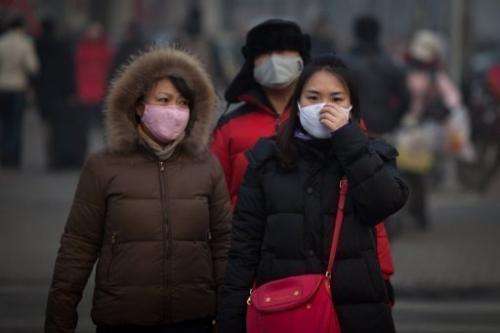Pedestrians wearing masks wait to cross a road in severe pollution in Beijing on January 12, 2013. China's capital Beijing will strengthen measures to combat pollution, state media reported, amid public anger over the dangerous air quality in the sprawling metropolis.
China's capital Beijing will strengthen measures to combat pollution, state media reported Tuesday, amid public anger over the dangerous air quality in the sprawling metropolis.
Acting mayor Wang Anshun told the city's legislature that steps will include removing old vehicles from roads, shutting down coal-fired plants and planting more greenery, the official Xinhua news agency reported.
"Beijing will complete afforestation of 66,000 hectares (163,020 acres) to make the city's forest coverage hit 40 percent or above" over the next five years, Wang said.
"Its total emissions of major pollutants will continue to be reduced."
Wang's comments came after dense smog engulfed large areas of northern China, including the capital, earlier this month, sparking public anger and media criticism.
At the height of the pollution, Beijing authorities said readings for PM2.5—particles small enough deeply to penetrate the lungs—hit 993 micrograms per cubic metre, almost 40 times the World Health Organisation's safe limit.
Experts quoted by state media blamed weak winds, saying fog had mixed with pollutants from vehicles and factories and had been trapped by mountains north and west of Beijing. Coal burning in winter was also a factor.
Wang said Beijing would retire 180,000 old vehicles and encourage the use of clean-energy autos in government departments.
The city would replace heating systems in 44,000 old, single-storey homes and coal-burning boilers with clean energy alternatives as well as control dust in construction, Wang said.
Beijing plans to close about 450 plants that spew large amounts of pollution, the report quoted municipal authorities as saying.
"The core issue with Beijing's air quality is the growing population," Xinhua quoted Jiang Yi, director of the Energy Saving Studies Centre at Tsinghua University, as saying.
"Currently, the population burden on Beijing's environment has reached maximum levels," Jiang said. "Pollution treatment cannot go on without population control."
Beijing's population stood at 20.69 million people at the end of 2012, an increase of half a million from the previous year, Xinhua said, citing the Beijing Municipal Statistics Bureau.
A total of 16.33 million people lived in Beijing in early 2008, it said.
(c) 2013 AFP
























